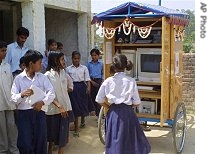2007年VOA标准英语-World Bank Boosts Entrepreneurs with Social Goa
搜索关注在线英语听力室公众号:tingroom,领取免费英语资料大礼包。
(单词翻译)
By Michael BowmanWashington
19 April 2007
It has been said that the best social program is a job. But a new generation of entrepreneurs is going beyond providing employment in developing nations to embracing and promoting social progress as part of their business model. With the backing of the World Bank, they are helping1 transform poverty-plagued regions from the Americas to Africa to Asia. VOA's Michael Bowman reports from Washington, where a group of such entrepreneurs recently met with World Bank officials.
 |
| School children gather around a mobile Internet classroom in northern Indian state of Uttar Pradesh's Bithoor village (file photo) |
"India, fundamentally, is not a very entrepreneurial-friendly country, he said. "We have some great entrepreneurs in the cities, but in the villages it is very difficult to even think of doing something on your own. We have always looked at ourselves as a welfare economy."
"Empowerment is directly against the bureaucratic2 system. The bureaucrats3 like people to be dependent on them. If information is the key, if people have the knowledge, then they are not dependent. And that is not good for the bureaucrats," he continued.
But Mishra's idea caught the attention of the Grassroots Business Initiative of the International Finance Corporation, an arm of the World Bank, which saw the initiative's potential to link rural India to the global economy, boost access to information and services, and spawn4 commercial and socially beneficial activity.
GBI backed Mishra's vision with financing and technical assistance. Today, his company, Drishtee, oversees5 a network of more than 1,500 Internet kiosks in villages across India, and aims to add thousands more in coming years.
While Mishra forged Drishtee, American entrepreneur Jeremy Hockenstein fell in love with Cambodia during a visit to Phnom Penh. Hockenstein, who has a background in information technology, launched a data entry firm in Cambodia with a unique business model.
"Our incoming employees are paid about three times the average income in the country," said Hockenstein. "The heart of our program is that employees work half a day -- go to work six hours a day and go to school the other six hours a day. Most of our employees are in their early 20s. This is a way for them to have both a first job experience and to further their education."
The enterprise, called Digital Divide Data, also has the support of the Grassroots Business Initiative. DDD has almost single-handedly forged a new industry for Cambodia and helped generate entrepreneurial activity.
"Former employees of ours have gone on to start other firms. And so I think we have played our role and within Cambodia put it on the map, [demonstrated] that it is possible to have an IT [information technology] sector6. We can do this," said Mishra.
Most new businesses require venture capital. But seed money is not always available in remote, underdeveloped regions of the world. Even where start-up funds are available, many investors7 shy away from ventures that emphasize social development rather than focusing exclusively on the bottom line.
That is where the Grassroots Business Initiative comes in. GBI Director Harold Rosen says he is proud of both Drishtee and Digital Divide Data, and hopes they can serve as models for other ventures.
"Both of them are making big strides towards becoming self-sustaining businesses," he said. "But they are also doing something wonderful developmentally for people that usually do not get that much help out of the trickle-down [economic] approach."
Other GBI-backed enterprises include a network of low-cost pharmacies8 and clinics in Kenya, an association of female handicraft artisans in Swaziland, and an initiative to engage indigenous9 people of the Amazon in creating paper products from readily grown plants.
Rosen says he sees GBI as playing a role in a larger battle to promote sustainable development on the world stage.
"It is fine to view the poor as a potential market, but they also need to create wealth. And, to take care of the poverty problem, we are going to have to find ways for people to make a sensible decision to stay in rural areas, and ways for them to make a living, and maybe even better their lives," said Rosen.
GBI's services begin with a diagnostic phase in which business ventures are evaluated, and needs and obstacles identified. An action plan is then formed, with targets for business development and social goals, followed by an assistance program to launch and sustain the operation.




